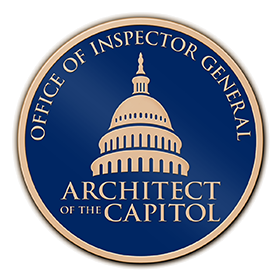Frequently Asked Questions
- Fraud is:
- Any intentional deception designed to deprive the AOC unlawfully of something of value or to secure from the AOC a benefit, privilege, allowance, or consideration to which he/she is not entitled. Such practices include, but are not limited to, the offer, payment, or acceptance of bribes or gratuities; making false statements; submitting false claims; using false weights or measures; evading or corrupting inspectors or other officials; deceit either by suppressing the truth or misrepresenting material facts; altering or substituting materials; falsifying records and books of accounts; arranging for secret profits, kickbacks, or commissions; and conspiring to use any of these devices. The term also includes conflict of interest cases, criminal irregularities, and the unauthorized disclosure of official information relating to procurement and disposal matters.
- Waste is:
- The extravagant careless, or needless expenditure of AOC funds, or the consumption of AOC property that results from deficient practices, systems, controls, or decisions. Intent is not a defining factor.
- Abuse is:
- The intentional or improper use of AOC resources that can include the excessive or improper use of one's position, in a manner contrary to its rightful or legally intended use. Examples include misuse of rank/grade, title, position, or authority or misuse of AOC resources.
- The AOC OIG is charged with oversight of all AOC programs and operations to prevent, detect, and deter fraud, waste, abuse and mismanagement.
- Did you know:
- Criminal violations are reported to the Department of Justice and AOC leadership for prosecution
- Administrative violations (violation of policy) are reported to AOC leadership for action
- AOC OIG investigations are conducted in accordance with CIGIE’s Quality Standards for Investigations
- The AOC OIG operates an independent hotline for complaint intake.
- The OIG encourages AOC employees and contractors, and the public to report any concerns about the use of AOC funds that are suspect of wrongdoing to include:
- Gross waste of government funds or property
- Misconduct or abuse of supervisor's authority
- Improper use of AOC resources or property
- Violations of federal law or AOC policy
- Reprisal for contacting the AOC OIG
- Contractor product substitution
- Travel or purchase card fraud
- Bribes, kickbacks, bid-rigging
- Theft of government property
- Falsification of time cards (time and attendance or WebTA fraud)
- Contractor false claims.
- The AOC OIG may refer issues not directly involving fraud, waste, abuse, or mismanagement to another Avenue of Assistance or outside agency such as:
- Equal employment opportunity/diversity issues
- Employee benefits and compensation issues
- Discrimination or management retaliation
- Individual conflicts with a supervisor
- Safety violations.
- The OIG conducts a preliminary assessment of the complaint to determine how it should proceed (e.g. testing). Our investigations are most successful when you provide as much pertinent information as you can.
- We cannot provide information regarding what action(s) have been taken on any allegation reported to our office.
- We do not disclose information contained in law enforcement records even to the individual submitting the allegation(s).
- Unless you are contacted directly by one of our investigators, there will be no communication from our office, outside of correspondence which may advise you that your matter has been referred to another entity if your submitted allegation(s) does/do not fall under the jurisdiction or authority of the AOC OIG.
Yes.
Per the AOC OIG Act and AOC Order 40-1, all AOC employees and contractors and are required to cooperate with OIG personnel during any OIG audit, investigation, inspection, evaluation, or other inquiry. This includes providing OIG officials with all requested documentation and information. Personnel may also be asked to respond to a survey, or be interviewed regarding a specific AOC program, or other matter of official concern to the OIG. All personnel are requested to respond in a timely manner to OIG requests for information. AOC OIG Special Agents are federal criminal investigators with law enforcement authority as it relates to AOC programs and operations.
Yes.
AOC OIG reports are generally publicly posted to the Council of the Inspectors General for Integrity and Efficiency (CIGIE) platform, Oversight.gov, and include AOC OIG findings and recommendations to improve economy and efficiency and/or detect and deter fraud, waste and abuse within AOC programs and operations.
- Both audits and evaluations share similar characteristics:
- Independent, objective, credible, and supported by evidence
- Examine effectiveness, efficiency, and economies
- Use reputable standards and best practices
- Improve stakeholder understanding and decision making
- Prepare annual plans based on:
- Congressional requests and mandates
- Identified risk to the AOC
- Hotline complaints and referrals
- Self-Initiated based on trends and significance
- Audits:
- Generally Accepted Government Auditing Standards
- AKA GAO Yellow Book
- Typically a comprehensive examination of a program or activity
- Often broad scope and backward looking
- More structured –typically follows the “why” and “how”
- Usually examines internal controls for program efficiency
- Often analyzes root causes for systematic and policy issues
- Recommendations often target accountability and standards
- Generally Accepted Government Auditing Standards
- Inspections and Evaluations:
- Quality Standards for Inspections and Evaluations
- AKA CIGIE Blue Book
- Typically a snapshot of a program or activity
- Often limited and focused scope and forward looking
- Less structured –typically follows the “what” and “so what”
- Usually examines conditions and cause/effect relationships
- Often analyzes process issues
- Recommendations often target program/process improvement
- Quality Standards for Inspections and Evaluations

